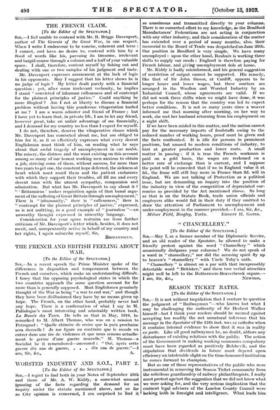WORSTED INDUSTRY AND S.O.I., PART 2.
[To the Editor of the SPEC'EATOR.]
Sur,,..4 regret to find bath in your Notes of September 29th and those of Mr. A. W. Kiddy, a somewhat unusual ignoring of the facts regarding the demand for an inquiry under the statute mentioned above, and so far as City 'opinion is concerned, I am surprised to "fmd it so unanimous and transmitted directly to your columns. There is no concerted effort to my knowledge, as the Bradford Manufacturers' Federations are not acting in conjunction with any other industry, and their consideration of the matter has extended over a period of many months, also, their memorial to the Board of Trade was despatched on June 26th. Our position in Bradford is very simple. We have many unemployed : upon the other hand, Roubaix is working three shifts to supply our needs : England is therefore paying for French labour, and giving unemployment dole at home.
Mr. Kiddy is badly misinformed, and his general suggestion of restriction of output cannot be supported. His remedy, like that of Sir John Simon, at Cardiff, appears to be longer hours and lower wages, but these matters are arranged in the Woollen and Worsted Industry by an Industrial Council, whose agreements are valid. If we did not work three shifts when we might have done, it was perhaps for the reason that the country was led to expect better conditions. It is not so many years since a weaver informed me that morning after morning, on her way to work, she met her husband returning from his employment on a night shift.
If we have been misled in this matter, and the nation cannot pay for the necessary imports of foodstuffs owing to the reduced number of working hours, proof must be given and the facts confronted. It is idle for persons in prominent positions, but unused to modern conditions of industry, to hint at greater production and lower costs. A small matter in passing if it is true the French workman is paid on a gold basis, the -wages are reckoned on a better rate of exchange than is current, and I suppose the point will be conceded that if we in England value it at 3d., the franc will still buy more in France than 3d. will in England. We are not talking of Protection as a political issue, but are demanding an inquiry into the position of the industry in view of the competition of depreciated cur- rencies as provided by the Act mentioned above. So long as that is on the Statute Book, trade union officials and employers alike would fail in their duty if they omitted to draw -the attention of Parliament to unemployment and under-employment in the manner -provided.—I am, Sir, &c., Milner Field, Bingley, Yorks. ERNEST II. GATES.


























































 Previous page
Previous page